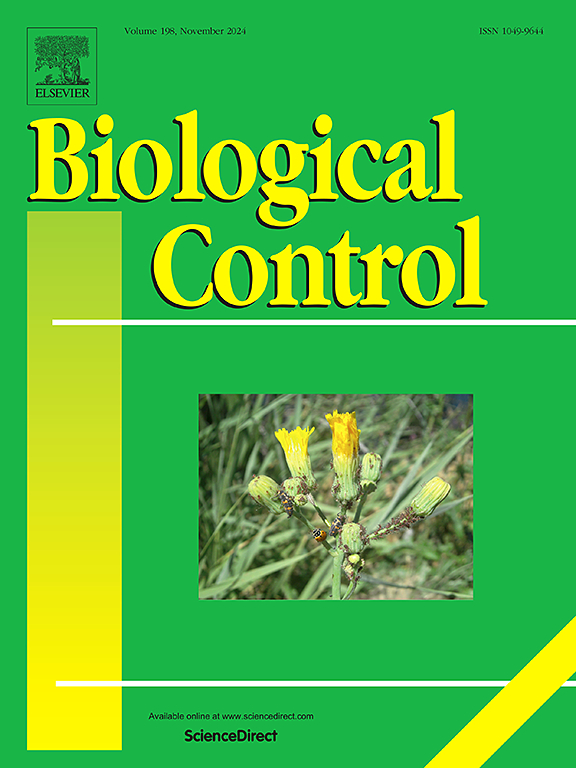Whole genome analysis of antagonistic and plant growth promoting Bacillus halotolerans KFD uncovers its molecular arsenal against the bayoud pathogen Fusarium oxysporum f.sp albedinis
IF 3.4
2区 农林科学
Q2 BIOTECHNOLOGY & APPLIED MICROBIOLOGY
引用次数: 0
Abstract
The bayoud disease stands as a serious threat to date palm cultivation and production in North Africa, particularly in Morocco. Biocontrol agents constitute an eco-friendly alternative solution to this problem, as breeding techniques or the use of chemical pesticides did not yield promising results, leading farmers to burn infected trees to limit the pathogen propagation. In this frame, we screened different bacteria isolated from date palm root surface for their potential to inhibit the pathogen F. oxysporum f.sp. albedinis (Foa). Out of forty tested isolates, one isolate showed promising results against Foa and exhibited as well broad-spectrum antifungal properties. Moreover, this isolate showed plant growth promotion (PGP) traits. We also conducted a greenhouse assay to evaluate the protective effect of our isolate. The result showed that our isolate effectively protected date palm seedlings against Foa. The genome characterization showed that our isolate has a genome size of approximately 3.9 MB and belongs to Bacillus halotolerans. We annotated 11 secondary metabolite gene clusters encompassing six known antifungal clusters, namely bacillibactin, bacilysin, bacillaene, fengycin, surfactin, and plipastatin. Moreover, we identified genes that encode carbohydrate-active enzymes involved in chitinase activities as well as the degradation of glucan in fungal cell walls. The screening of genes linked to plant growth promotion identified genes involved in phosphate metabolism, indole-3-acetic acid and siderophore production, and free nitrogen fixation.
Our results show that B. halotolerans KFD represents a potential biocontrol agent that could be used to manage bayoud disease and promote the growth of date palm. To the best of our knowledge, our study is the first to isolate and decipher the genomic features of a B. halotolerans strain from the rhizosphere of date palm.
拮抗和促进植物生长的耐盐芽孢杆菌KFD的全基因组分析揭示了其对bayoud病原菌镰刀菌f.sp . albedinis的分子库
巴乌德病对北非,特别是摩洛哥的枣椰树种植和生产构成严重威胁。生物防治剂是解决这一问题的环保替代方案,因为育种技术或化学农药的使用没有产生令人满意的结果,导致农民焚烧受感染的树木以限制病原体的繁殖。在本研究中,我们筛选了从枣椰树根表面分离的不同细菌,研究它们对病原菌尖孢菌的抑制作用。albedinis(失落)。在40个被测试的分离株中,有一个分离株对Foa表现出良好的效果,并表现出良好的广谱抗真菌性能。此外,该分离物还具有植物生长促进(PGP)性状。我们还进行了温室试验,以评估我们的分离物的保护作用。结果表明,该分离物能有效保护枣椰树幼苗免受Foa的侵害。基因组鉴定表明,分离物基因组大小约为3.9 MB,属于耐盐芽孢杆菌。我们注释了11个次生代谢物基因簇,包括6个已知的抗真菌簇,即杆菌杆菌素、杆菌素、杆菌烯、风霉素、表面素和普立司他丁。此外,我们确定了编码碳水化合物活性酶的基因,这些酶参与几丁质酶的活性以及真菌细胞壁中葡聚糖的降解。在植物生长促进相关基因的筛选中,发现了与磷酸盐代谢、吲哚-3-乙酸和铁载体产生以及游离固氮有关的基因。结果表明,耐halotolerans KFD是一种潜在的生物防治剂,可用于防治bayoud病和促进枣椰树的生长。据我们所知,我们的研究是第一个从枣椰树根际分离和破译耐盐芽孢杆菌菌株的基因组特征。
本文章由计算机程序翻译,如有差异,请以英文原文为准。
求助全文
约1分钟内获得全文
求助全文
来源期刊

Biological Control
生物-昆虫学
CiteScore
7.40
自引率
7.10%
发文量
220
审稿时长
63 days
期刊介绍:
Biological control is an environmentally sound and effective means of reducing or mitigating pests and pest effects through the use of natural enemies. The aim of Biological Control is to promote this science and technology through publication of original research articles and reviews of research and theory. The journal devotes a section to reports on biotechnologies dealing with the elucidation and use of genes or gene products for the enhancement of biological control agents.
The journal encompasses biological control of viral, microbial, nematode, insect, mite, weed, and vertebrate pests in agriculture, aquatic, forest, natural resource, stored product, and urban environments. Biological control of arthropod pests of human and domestic animals is also included. Ecological, molecular, and biotechnological approaches to the understanding of biological control are welcome.
 求助内容:
求助内容: 应助结果提醒方式:
应助结果提醒方式:


